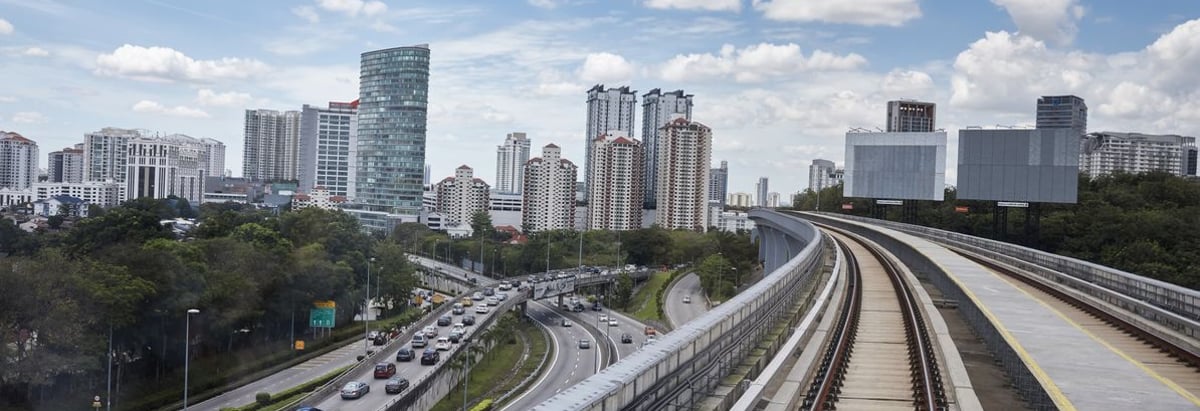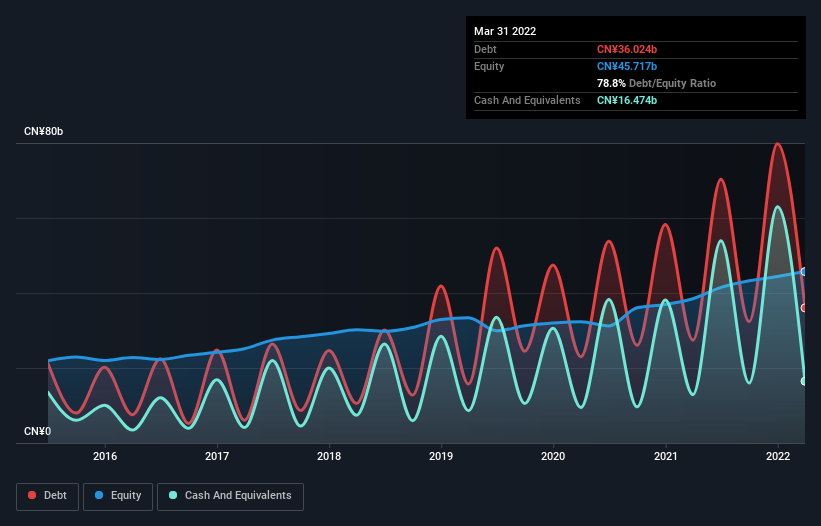
Legendary fund manager Li Lu (who Charlie Munger backed) once said, 'The biggest investment risk is not the volatility of prices, but whether you will suffer a permanent loss of capital.' It's only natural to consider a company's balance sheet when you examine how risky it is, since debt is often involved when a business collapses. As with many other companies Zhejiang Expressway Co., Ltd. (HKG:576) makes use of debt. But should shareholders be worried about its use of debt?
Why Does Debt Bring Risk?
Generally speaking, debt only becomes a real problem when a company can't easily pay it off, either by raising capital or with its own cash flow. In the worst case scenario, a company can go bankrupt if it cannot pay its creditors. While that is not too common, we often do see indebted companies permanently diluting shareholders because lenders force them to raise capital at a distressed price. Having said that, the most common situation is where a company manages its debt reasonably well - and to its own advantage. The first step when considering a company's debt levels is to consider its cash and debt together.
View our latest analysis for Zhejiang Expressway
What Is Zhejiang Expressway's Net Debt?
You can click the graphic below for the historical numbers, but it shows that as of March 2022 Zhejiang Expressway had CN¥36.0b of debt, an increase on CN¥27.4b, over one year. However, it does have CN¥16.5b in cash offsetting this, leading to net debt of about CN¥19.6b.

A Look At Zhejiang Expressway's Liabilities
According to the last reported balance sheet, Zhejiang Expressway had liabilities of CN¥90.7b due within 12 months, and liabilities of CN¥36.0b due beyond 12 months. On the other hand, it had cash of CN¥16.5b and CN¥27.1b worth of receivables due within a year. So its liabilities total CN¥83.1b more than the combination of its cash and short-term receivables.
The deficiency here weighs heavily on the CN¥24.4b company itself, as if a child were struggling under the weight of an enormous back-pack full of books, his sports gear, and a trumpet. So we'd watch its balance sheet closely, without a doubt. At the end of the day, Zhejiang Expressway would probably need a major re-capitalization if its creditors were to demand repayment.
We use two main ratios to inform us about debt levels relative to earnings. The first is net debt divided by earnings before interest, tax, depreciation, and amortization (EBITDA), while the second is how many times its earnings before interest and tax (EBIT) covers its interest expense (or its interest cover, for short). Thus we consider debt relative to earnings both with and without depreciation and amortization expenses.
Zhejiang Expressway has net debt worth 2.0 times EBITDA, which isn't too much, but its interest cover looks a bit on the low side, with EBIT at only 3.7 times the interest expense. While that doesn't worry us too much, it does suggest the interest payments are somewhat of a burden. We saw Zhejiang Expressway grow its EBIT by 8.8% in the last twelve months. That's far from incredible but it is a good thing, when it comes to paying off debt. When analysing debt levels, the balance sheet is the obvious place to start. But it is future earnings, more than anything, that will determine Zhejiang Expressway's ability to maintain a healthy balance sheet going forward. So if you want to see what the professionals think, you might find this free report on analyst profit forecasts to be interesting.
Finally, a business needs free cash flow to pay off debt; accounting profits just don't cut it. So it's worth checking how much of that EBIT is backed by free cash flow. Over the last three years, Zhejiang Expressway reported free cash flow worth 11% of its EBIT, which is really quite low. That limp level of cash conversion undermines its ability to manage and pay down debt.
Our View
Mulling over Zhejiang Expressway's attempt at staying on top of its total liabilities, we're certainly not enthusiastic. But at least it's pretty decent at growing its EBIT; that's encouraging. We should also note that Infrastructure industry companies like Zhejiang Expressway commonly do use debt without problems. We're quite clear that we consider Zhejiang Expressway to be really rather risky, as a result of its balance sheet health. So we're almost as wary of this stock as a hungry kitten is about falling into its owner's fish pond: once bitten, twice shy, as they say. There's no doubt that we learn most about debt from the balance sheet. But ultimately, every company can contain risks that exist outside of the balance sheet. For example, we've discovered 2 warning signs for Zhejiang Expressway (1 makes us a bit uncomfortable!) that you should be aware of before investing here.
At the end of the day, it's often better to focus on companies that are free from net debt. You can access our special list of such companies (all with a track record of profit growth). It's free.
Valuation is complex, but we're here to simplify it.
Discover if Zhejiang Expressway might be undervalued or overvalued with our detailed analysis, featuring fair value estimates, potential risks, dividends, insider trades, and its financial condition.
Access Free AnalysisHave feedback on this article? Concerned about the content? Get in touch with us directly. Alternatively, email editorial-team (at) simplywallst.com.
This article by Simply Wall St is general in nature. We provide commentary based on historical data and analyst forecasts only using an unbiased methodology and our articles are not intended to be financial advice. It does not constitute a recommendation to buy or sell any stock, and does not take account of your objectives, or your financial situation. We aim to bring you long-term focused analysis driven by fundamental data. Note that our analysis may not factor in the latest price-sensitive company announcements or qualitative material. Simply Wall St has no position in any stocks mentioned.
About SEHK:576
Zhejiang Expressway
An investment holding company, invests, develops, maintains, and operates roads in the People’s Republic of China.
Flawless balance sheet, undervalued and pays a dividend.
Market Insights
Community Narratives



